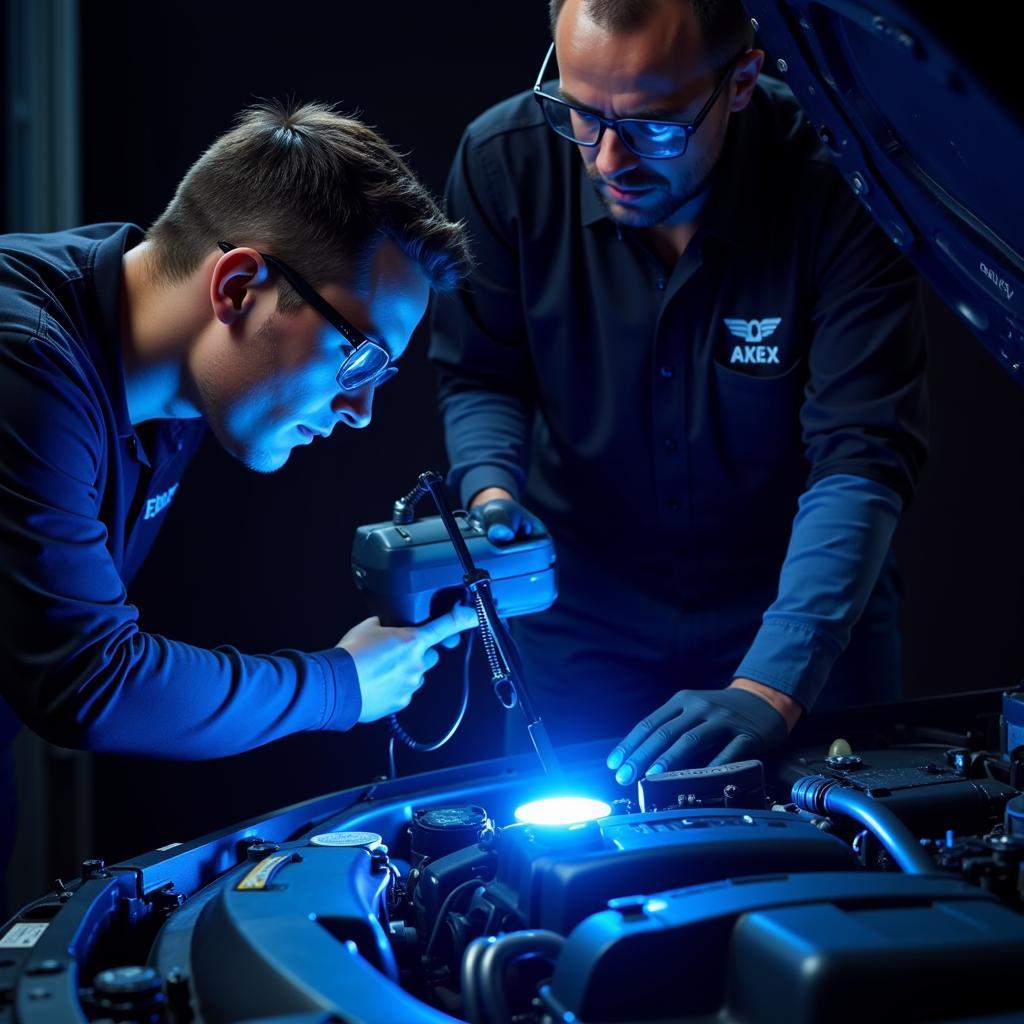A leaky car AC can be a real summer bummer. But don’t sweat it! This guide covers everything you need to know to Fix Leaky Ac Car problems, from diagnosing the issue to finding the right repair solution. We’ll empower you to tackle this common automotive woe whether you’re a DIY enthusiast or prefer professional help.
If your car AC isn’t blowing cold air like it used to, a leak might be the culprit. Let’s explore the most common causes and how to identify them. Places near me that fix air conditioners in cars can offer quick and convenient repair services.
Why is My Car AC Leaking?
Several components within your car’s AC system can spring a leak. These include:
- Hoses and Connections: The flexible hoses that carry refrigerant can develop cracks or leaks at connection points due to age, wear and tear, or road debris.
- Condenser: Located at the front of your vehicle, the condenser is susceptible to damage from rocks and other debris, leading to leaks.
- Evaporator: Hidden within the dashboard, the evaporator can develop leaks due to corrosion or clogs. These leaks are often harder to detect.
- Compressor Seals: The compressor, the heart of the AC system, relies on seals to maintain pressure. Worn or damaged seals can result in refrigerant leaks.
- O-rings: These small, but crucial, seals are found throughout the system and can dry out or crack over time, causing leaks.
How to Diagnose a Leaky Car AC
Pinpointing the source of the leak is crucial for an effective repair. Here are some common methods:
- Visual Inspection: Carefully examine all visible AC components, including hoses, connections, and the condenser, for signs of damage, leaks, or oily residue.
- UV Dye Test: This involves injecting a special UV dye into the AC system. The dye will circulate with the refrigerant and become visible under a UV light, highlighting the leak location. What kind of car mechanic fixes air conditioners near me can help with these specialized diagnostics.
- Electronic Leak Detector: These detectors are sensitive to refrigerant gases and can help pinpoint leaks, especially in hard-to-reach areas.
- Pressure Test: A pressure test checks for leaks by pressurizing the system with nitrogen. A drop in pressure indicates a leak.
 Car AC Leak Detection Using UV Dye
Car AC Leak Detection Using UV Dye
DIY Fixes for Leaky AC Car (Simple Solutions)
Some minor leaks, such as those in hose connections, might be addressable with DIY solutions. However, remember that working with refrigerants requires caution.
- Tighten Loose Connections: Check all accessible hose connections and tighten them carefully. Over-tightening can cause damage, so use caution.
- Sealant Products: Specialized AC sealants are available for minor leaks. Follow the product instructions carefully.
Be aware that these are temporary fixes and may not be suitable for all leaks. For complex leaks or if you’re unsure, seek professional assistance. Fix my car air conditioner near me provides convenient repair options.
When to Call a Professional
Most AC leak repairs require specialized tools and knowledge. It’s best to contact a qualified technician if:
- You can’t locate the leak.
- The leak is in a hard-to-reach area.
- You’re uncomfortable working with refrigerants.
- The leak involves major components like the compressor or evaporator.
Preventing Future Leaks
Regular maintenance can help prevent AC leaks:
- Annual AC Service: Have your AC system inspected and serviced annually by a professional.
- Clean the Condenser: Regularly clean debris and dirt from the condenser to prevent damage and improve efficiency.
- Check for Leaks: Periodically inspect hoses and connections for signs of leaks.
What Kind of Refrigerant Does My Car Use?
Most modern vehicles use R-134a refrigerant, while older models may use R-12. It’s crucial to use the correct refrigerant for your car’s system.
Can I Add Refrigerant Myself?
While DIY refrigerant recharge kits are available, it’s recommended to have a professional recharge your AC system. They can accurately diagnose the leak and ensure the proper amount of refrigerant is added.
How Much Does it Cost to Fix a Leaky Car AC?
The cost of repair varies depending on the location and severity of the leak. Minor repairs can cost a few hundred dollars, while major repairs, such as compressor replacement, can cost significantly more. Best place to fix car air conditioner near me can provide competitive pricing and quality service.
“Regular AC maintenance is key to preventing costly repairs down the road,” advises John Smith, Senior Automotive Technician at Smith Auto Repair. “Catching leaks early can save you time and money.”
“Ignoring a leaky AC can lead to more significant problems, including compressor failure,” adds Jane Doe, Certified HVAC Specialist. “It’s always best to address the issue promptly.”
Conclusion
Fixing a leaky car AC is essential for comfortable driving, especially during warmer months. By understanding the causes, diagnostic methods, and repair options, you can effectively address this common problem and keep your car cool. Remember, regular maintenance and prompt attention to leaks can prevent more extensive and costly repairs in the future. Don’t hesitate to connect with AutoTipPro at +1 (641) 206-8880 or visit our office at 500 N St Mary’s St, San Antonio, TX 78205, United States for expert assistance. Places near me that fix car air conditioner can be a valuable resource for finding reliable repair services in your area.




Leave a Reply